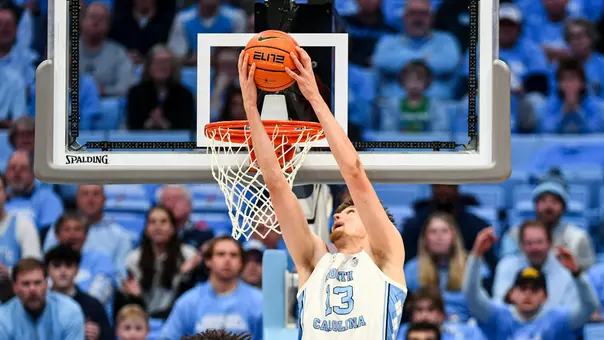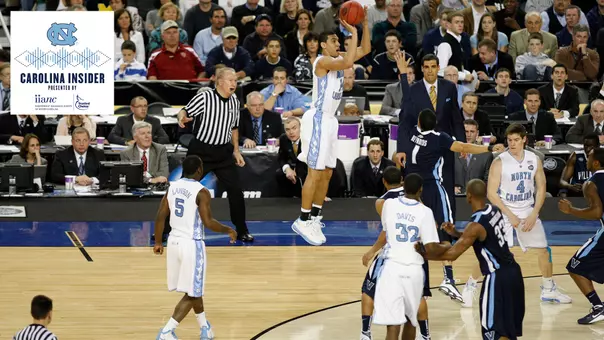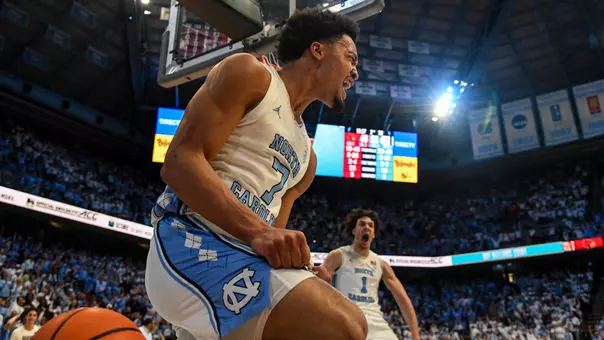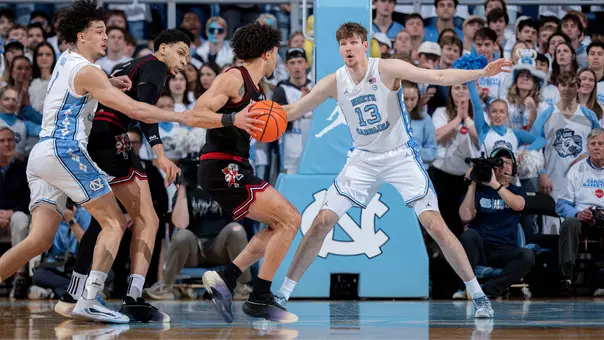University of North Carolina Athletics
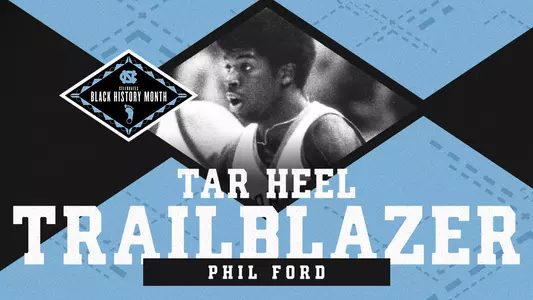
Phil Ford: Tar Heel Trailblazer
February 8, 2016 | General, Men's Basketball, Featured Writers, Turner Walston
Update, Feb. 2019:
In celebration of Black History Month, GoHeels.com will take a look back at each of the Tar Heel Trailblazers honored since 2014, with updates by Pat James.
Phil Ford continues to provide individual player instruction, assist with camps and give speeches to groups through Phil Ford Basketball. He's also continued his work with the Phil Ford Foundation, which is dedicated to tackling the epidemic of childhood obesity.
By Turner Walston
Two-time ACC Male Athlete of the Year. Three-time All-America. National Player of the Year. Gold medalist. Phil Ford was already a legend. Now, the University of North Carolina is proud to officially recognize Ford as a Tar Heel Trailblazer.
A native of Rocky Mount, Ford came to epitomize Carolina basketball under Dean Smith. He scored 2,290 points in his career, holding the school record until Tyler Hansbrough eclipsed him in December 2008. But Ford's points came within Smith's system; his 753 assists set a school record as well. He is now third all-time at Carolina in that category, behind only Ed Cota and Kenny Smith.
Ford's willingness to do what was necessary for the team, be it scoring or setting up teammates, underscore a key quality found in many Dean Smith players. "When you think of Carolina basketball, and when I think of Coach Smith, there are some bullet words, but one of them is 'unselfishness,'" Ford says. "I always thought that it would be hard for an extremely selfish player to play at North Carolina, if you weren't willing to do what's best for the team on the court. Off the court, Coach Smith always emphasized what's best for the individual, but on the court, it's what's best for the team."
The man who tossed up the four fingers to run Smith's Four Corners offense, who became an icon in Carolina blue, is quick to credit his teammates for the assist. "I get a lot of credit for Four Corners, but in order for Four Corners to work, you have to have five very good ball-handlers on the court," he says. "You have to have five very good free throw shooters on the court, you have to five savvy players on the court, you have to have five good defenders and five good rebounders, or Four Corners doesn't work. Since I was the smallest guy, who wasn't in the middle, Four Corners is synonymous with my name. That doesn't work if it's not for Mike O'Koren and Walter Davis and John Kuester and Mitch Kupchak and Tommy LaGarde, and on down the line."
Kupchak, Davis and LaGarde joined Ford and Smith in Montreal at the 1976 Summer Olympics. Four years after Team USA's controversial loss to the Soviet Union in Munich, Smith was tasked with winning back the gold. "That's the only time in my entire career as a player or coach that I heard Coach Smith say winning was important, during the Olympics," Ford remembers. "At North Carolina, he never talked about winning. He always talked about doing the best that we could do, being prepared and playing smart, playing hard, playing together. If we would do all those things that we were supposed to do, winning was a by-product of those things. But in the Olympics, the only thing he emphasized was winning."
The Americans were led in scoring by Notre Dame's Adrian Dantley and Indiana's Scott May. Ford averaged 11.3 points and led the team with 9.0 assists per game. Team USA triumphed over Yugoslavia to win the gold medal. "We were able to bring the gold medal back, and it's not even spoken about anymore," Ford says. "But had we lost, they'd still be talking about it."
After his Carolina playing career ended, Ford was selected second overall by the Kansas City Kings in the 1978 NBA Draft. He spent seven years in the NBA and returned to Carolina as a Smith assistant in 1988. After 12 years on the sidelines in Chapel Hill, Ford spent time as an assistant with the New York Knicks and Charlotte Bobcats. Today, he lives in the Triangle and is involved in multiple causes. He is a part of the group working develop Naismith Legacy Park in Wake County, a complex that will feature multiple gyms, classrooms and housing. He works with HumanCentric Performance, a company that has the patent on a mouthpiece that reads athletes' core temperature to monitor performance and player safety. Through Phil Ford Basketball, he provides individual player instruction and gives speeches to groups. The stakes may not be the same as they were in his playing days, but the rewards are great. "One of the most rewarding things I do is, when I work with a second or third grader and if he or she is right-handed, you teach them how to do a left-handed lay-up –something that's really trivial to me– but the look on their face when they get that left-handed lay-up down, all the money in the world can't buy the feeling that you have to know that you helped a youngster achieve that."
The Phil Ford Foundation is dedicated to tackling the epidemic of childhood obesity. Several years ago, Ford was playing golf with his cousin Alex, the owner of HumanCentric Performance. Alex asked Ford what cause his foundation supported and was surprised to learn that Ford did not have one at the time. "He said, 'Well, let's start one, you and me,'" Phil Ford remembers. Ford flashed back to a basketball camp a few months earlier, when he saw an obese young man giving his best effort that just couldn't keep up. "I called [Alex] back and I said, 'Let's do childhood obesity.'"
Ford's Foundation has partnered with N.C. Children's Hospital and the UNC Department of Pediatrics to treat and prevent the problem of obesity. Ford discovered that Eliana Perrin, MD, MPH was practically in his backyard in Chapel Hill, and the partnership has flourished. "I just thought I was just going to try to help some overweight children in the state of North Carolina," Ford says, "but come to find out it's a national epidemic, and I'm really happy to be a part of it. Dr. Perrin is world-renowned. She travels all over the world speaking, and she's my All-American. That's what I call her."
Thirty-eight years since he played in Carolina blue, Phil Ford is still handing out assists, and still valuing his teammates. Last year, Roy Williams called for Four Corners on the first play of the first home game after Smith died. "I thought that was one of the nicest gestures that anyone had done for anyone that I've ever seen in my life, when Roy did that," says the man who more than any other player defined the play. "The only thing that I kind of kidded Roy about that after the game was, that was a nice gesture but those little boys and girls sitting in the student section had no idea what that was," he laughs.
A year later, Phil Ford is a Tar Heel Trailblazer. He points to the passer yet again. "I don't consider myself a trailblazer, but I'm truly humbled to receive this award," he says. "The University of North Carolina was everything that I thought it would be and more, academically, athletically and socially. I think having the opportunity to attend one of the most prestigious undergrad business schools in America was quite an honor, and also to play for the greatest basketball coach to coach basketball was quite an honor, and to be a student-athlete at the University of North Carolina was a tremendous honor as well."

